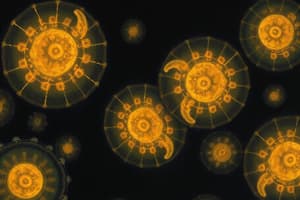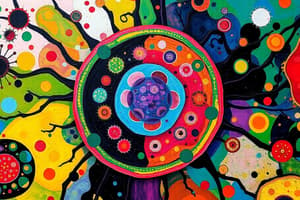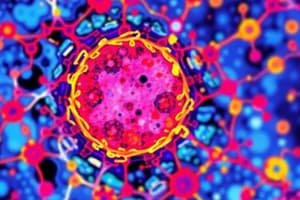Podcast
Questions and Answers
Who was the British scientist that paved the way to the discovery of cells?
Who was the British scientist that paved the way to the discovery of cells?
Robert Hooke
What did Anton Van Leuwenhoek refer to the moving protists he found inside the cells?
What did Anton Van Leuwenhoek refer to the moving protists he found inside the cells?
Animalcules
What did Matthias Jacob Schleiden contribute to the development of cell theory?
What did Matthias Jacob Schleiden contribute to the development of cell theory?
- Developed the microscope
- Concluded that all plants are composed of cells (correct)
- First to formulate cell theory
- Discovered animal cells
Which scientist is associated with the cell theory's development alongside Robert Hooke?
Which scientist is associated with the cell theory's development alongside Robert Hooke?
What major hypothesis did Rudolf Virchow contribute to cell theory?
What major hypothesis did Rudolf Virchow contribute to cell theory?
Robert Hooke discovered cells by examining a piece of cork.
Robert Hooke discovered cells by examining a piece of cork.
Flashcards are hidden until you start studying
Study Notes
Overview of Cell Theory Development
- Robert Hooke, a British scientist, first discovered cells in 1665 while examining cork with a crude microscope, coining the term "cells" from the Latin cellulae meaning "little rooms."
- Hooke's samples were actually the outer walls of dead plant cells.
- Anton Van Leeuwenhoek, a Dutch scientist, advanced the study of cells using a more refined microscope, discovering moving protists he referred to as animalcules by the late 1600s.
Key Scientists and Contributions to Cell Theory
-
Robert Hooke:
- First to describe and name cells from cork samples.
- His work laid the groundwork for future cell studies, emphasizing the importance of microscopy in biological research.
-
Anton Van Leeuwenhoek:
- Improved microscope design allowed detailed observation of living cells and microorganisms.
- Introduced the concept of “tiny animals” in the microscopic world, contributing to the understanding of cellular life.
-
Matthias Jacob Schleiden:
- Focused on plant cells and proposed that all plants are made of cells.
- His findings established the importance of cells as the basic unit of life in plants, contributing significantly to the formulation of cell theory.
-
Theodor Schwann:
- Expanded Schleiden's idea to animals, asserting that all animal tissues are composed of cells.
- Formulated the first two tenets of cell theory, together with Schleiden.
-
Rudolf Virchow:
- Added the third tenet of cell theory, stating that all cells come from pre-existing cells.
- His work emphasized the continuity of life and cellular reproduction.
Postulates of Cell Theory
- All living organisms are composed of one or more cells.
- The cell is the basic unit of life in all living organisms.
- All cells arise from pre-existing cells, establishing a continuity of life at the cellular level.
Impact of Cell Theory
- The formulation of cell theory laid the foundation for modern biology and cellular biology.
- Recognized the importance of microscopic research in understanding the complex nature of life.
Studying That Suits You
Use AI to generate personalized quizzes and flashcards to suit your learning preferences.




